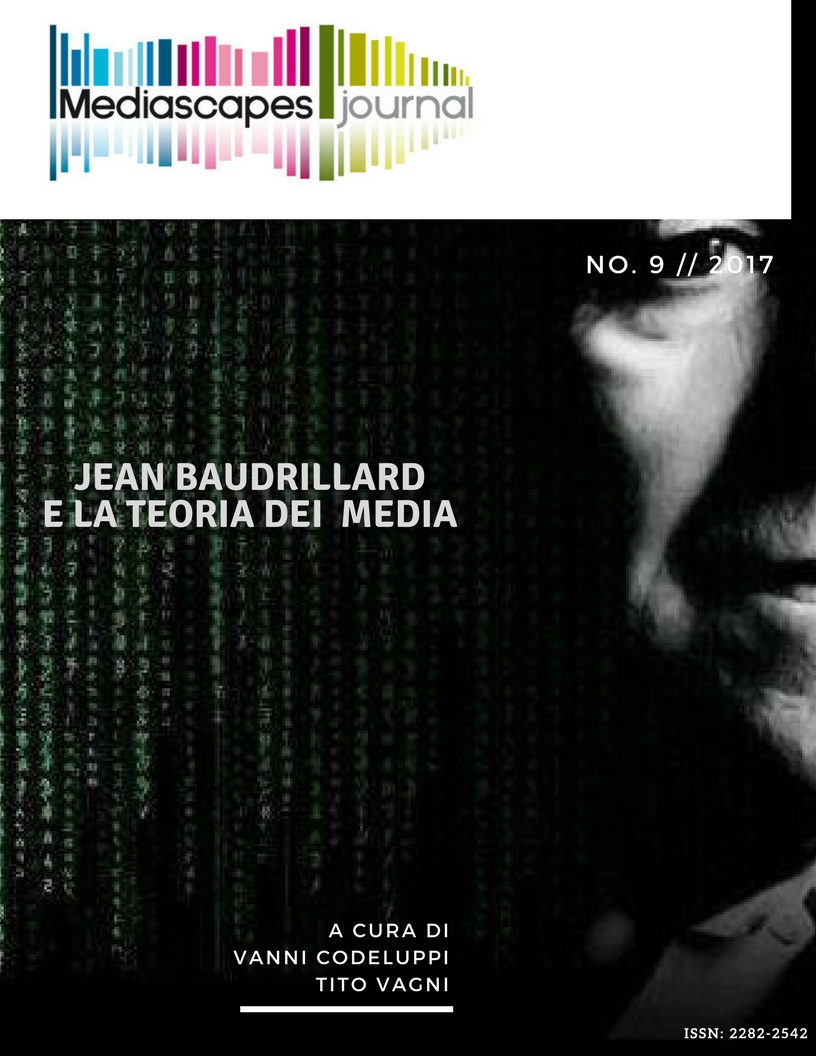“The meta-language of an absent world”. Baudrillard, McLuhan and the media consumption
Parole chiave:
media consumption, reproducible society, mainstream as meta-language, automated messagesAbstract
This essay aims to delve into the reflections upon the media consumption developed by Baudrillard in one of the central paragraphs of The Consumer Society (1970), focused on Marshall McLuhan’s theory of media. The purpose is to dwell on those factors that, according to Baudrillard, determined the functional transformation of the mainstream medium into a denotative medium, founded on the construction and diffusion of particular signs and social meanings. In the aforementioned paragraph, titled “medium is message”, Baudrillard further investigates some insights developed by McLuhan in Understanding media (1964). He extends his semiotic approach to the world of media (and in particular to television) and focuses on the new literacy of mainstream culture. His plan is to support the interpretation of social consumption as a communication process. In particular, Baudrillard dwells on two of McLuhan’s insights, referred to the appearance of the media society. On the one hand, he analyzes the power that media have to alter “deep down and unconsciously” (Baudrillard, 1970, p. 123) the sensitive relationships and the perceptive models of the social actors. On the other he deals with the power of mass media to “neutralize the lived, unique, eventual character of the world and substitute for it a multiple universe of media which, as such, are homogeneous one with another, signifying each other reciprocally and referring back and forth to each other” (Baudrillard, 1970, p. 124). The replacement of experiences with objects and symbols expresses one of the trademarks of the consumer society that Baudrillard probes starting from the correspondence between the medium and the message pointed out by McLuhan. Baudrillard exploits the topic of the tribalization peculiar to homo tecnologicus, just to understand the symbolic distance between the old manuscript or typographic civilization and the new era of images, shaped by cinema and television.
Baudrillard provides a stimulating interpretation of media as advice able to modify our perceptive faculties. This is one of the most interesting aspects of his analysis of the television consumption, destined to convey the ideology of omnipotence of a system and superimposable symbols. Hence, the interpretation of TV images (applicable to the contemporary digital world too), as a “metalanguage of an absent world” influencing the cultural, value and symbolic dimension, observed by means of the magnifying glass of McLuhan’s telescope.
##submission.downloads##
Pubblicato
Come citare
Fascicolo
Sezione
Licenza
Gli autori che pubblicano su questa rivista accettano le seguenti condizioni:
- Gli autori mantengono i diritti sulla loro opera e cedono alla rivista il diritto di prima pubblicazione dell'opera, contemporaneamente licenziata sotto una Licenza Creative Commons - Attribuzione che permette ad altri di condividere l'opera indicando la paternità intellettuale e la prima pubblicazione su questa rivista.
- Gli autori possono aderire ad altri accordi di licenza non esclusiva per la distribuzione della versione dell'opera pubblicata (es. depositarla in un archivio istituzionale o pubblicarla in una monografia), a patto di indicare che la prima pubblicazione è avvenuta su questa rivista.
- Gli autori possono diffondere la loro opera online (es. in repository istituzionali o nel loro sito web) prima e durante il processo di submission, poiché può portare a scambi produttivi e aumentare le citazioni dell'opera pubblicata (Vedi The Effect of Open Access).


